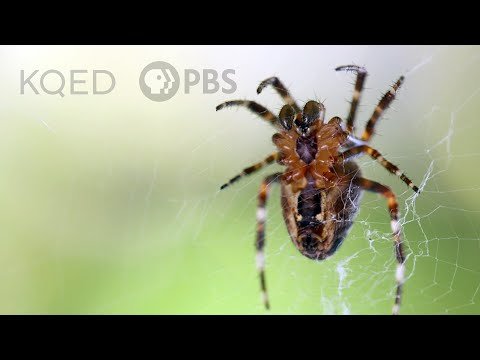Orb weaver spiders build exquisite spiral webs not only to catch insects, but to extend their senses. Once they shrink-wrap their prey with silk, the nearly blind spiders can store them for later, and read their web’s strands as a kind of memory map to guide them back.
Take the PBS Digital Studios Survey!
SUBSCRIBE to Deep Look:
DEEP LOOK is an ultra-HD (4K) wildlife and nature series created by KQED San Francisco and presented by PBS Digital Studios. See the unseen at the very edge of our visible world. Explore big scientific mysteries by going incredibly small.
—
The more than 48,000 spider species create a wide variety of web styles. There are over 4,000 different species of orb weaver spiders alone; these are the eight-legged spinners that create the famous spiral-shaped webs.
Anyone who’s watched orb weavers in action has seen them use their exquisite creations to deftly ensnare flying insects. Impressive as this, the webs function as much more than deadly traps.
Webs play an integral role in everything an orb weaver does. When spiders are hungry, they can tighten the web’s strands and even adjust its size and shape, depending on what size of prey they’re in the mood for. These species are only able to see light, dark and a little movement, but they are somehow able to quickly navigate their webs, pinpointing their unlucky victims and binding them in silk, a meal saved for later.
Because they can do so much with such tiny brains, some researchers think orb weavers use their webs as a form of extended cognition, outsourcing advanced mental tasks like problem-solving and memory. For example, once they have killed and wrapped their prey, a spider can store it for later, then easily find it again. They don’t need to remember every single thread they have spun — just a few previous steps. By using their webs to do some of their thinking for them, orb weavers may be preserving precious brain power for other necessary and complex tasks like capturing prey.
— Where do orb weavers spiders live?
Orb weaver species live everywhere on planet earth except for Antarctica and the Arctic. As long as there is abundant food (i.e. insects) and a place to build their web, you are likely to find an orb weaver.
— What other kinds of spider webs are there besides orb webs?
In addition to the signature spiral-shaped designs made by orb weavers, spider webs come in various other styles, such as tangles (aka cobwebs), funnels and sheets.
—+ Read the entire article on KQED Science:
—+ For more information:
The work of Thomas Hesselberg
Hilton Japyassú’s work on extended cognition in spiders
—+ Shoutout!
🏆Congratulations🏆 to the following fans on our Deep Look Community Tab for being the top five emjoi and ascii artists for this episode!
Eevee Extreme (55 votes)
Amber Shepherd (20)
Second Maker by KS (16)
Seth Holton (16)
Faixan Lol (10)
—+ Thank you to our Top Patreon Supporters ($10+ per month)!
Bill Cass
Justin Bull
Burt Humburg
Alex
Shebastian Reyes
Egg-Roll
Josh Kuroda
Daniel Weinstein
Chris B Emrick
Karen Reynolds
Daniel Pang
Tea Torvinen
dane rosseter
David Deshpande
Daisuke Goto
Companion Cube
Nathan Z
Tianxing Wang
luna
Kelly Hong
Kevin Judge
Elizabeth Ann Ditz
Laurel Przybylski
Gerardo Alfaro
Leonhardt Wille
Robert Amling
Mary Truland
Shelley Pearson Cranshaw
Supernovabetty
Laura Sanborn
Sayantan Dasgupta
Cindy McGill
Pamela Parker
Joshua Murallon Robertson
monoirre
Silvan Wendland
Aurora
Dia
Roberta K Wright
Sonia Tanlimco
Levi Cai
Guillaume Morin
Misia Clive
Caitlin McDonough
Rick Wong
Nathan Wright
Titania Juang
Carlos Carrasco
Nicolette Ray
Kristy Freeman
Alexandre Valdetaro
Syniurge
Dogman
Cristen Rasmussen
Geidi Rodriguez
Blanca Vides
Scott Faunce
Noreen Herrington
Kallie Moore
SueEllen McCann
Teresa Lavell
Louis O’Neill
Aurora Mitchell
Sharon Merritt
Pushkar Chitale
KW
Joao Ascensao
TierZoo
—+ Follow KQED Science and Deep Look:
Instagram:
Twitter:
KQED Science on kqed.org:
—+ About KQED
KQED, an NPR and PBS affiliate in San Francisco, CA, serves Northern California and beyond with a public-supported alternative to commercial TV, Radio and web media.
Funding for Deep Look is provided in part by PBS Digital Studios. Deep Look is a project of KQED Science, the largest science and environment reporting unit in California. KQED Science is supported by The National Science Foundation, the Dirk and Charlene Kabcenell Foundation, the Vadasz Family Foundation, the Gordon and Betty Moore Foundation, Campaign 21 and the members of KQED.
#orbweaverspiders #spiders #spiderwebs

